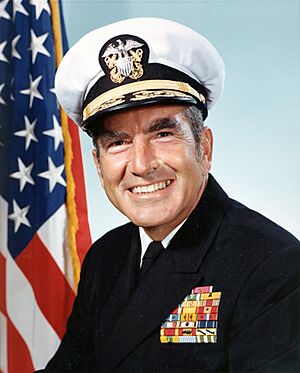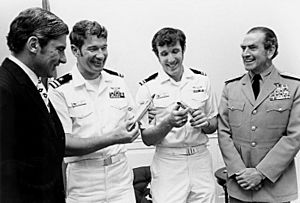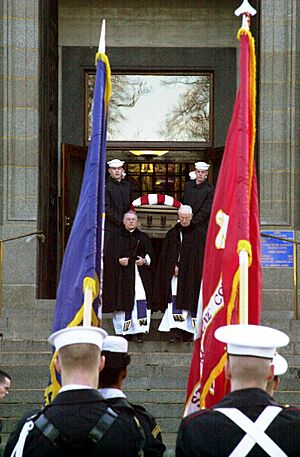Elmo Zumwalt facts for kids
Quick facts for kids
Elmo Zumwalt
|
|
|---|---|
 |
|
| Nickname(s) | "Bud" |
| Born | November 29, 1920 San Francisco, California, US |
| Died | January 2, 2000 (aged 79) Durham, North Carolina, US |
| Buried |
United States Naval Academy Cemetery
|
| Allegiance | |
| Service/ |
|
| Years of service | 1942–1974 |
| Rank | Admiral |
| Unit |
|
| Commands held |
|
| Battles/wars | |
| Awards |
|
| Spouse(s) |
|
Elmo Russell "Bud" Zumwalt Jr. (born November 29, 1920 – died January 2, 2000) was a highly respected officer in the United States Navy. He became the youngest person ever to serve as the Chief of Naval Operations (CNO). As an admiral and the 19th CNO, Zumwalt played a big part in American military history, especially during the Vietnam War. He was known for making important changes to Navy rules to improve life for sailors and help ease racial tensions. After serving for 32 years, he retired and later ran for the United States Senate, though he did not win.
Contents
Early Life and Education
Elmo Zumwalt Jr. was born in San Francisco, California. His parents, Elmo Russell Zumwalt and Frances Pearl Zumwalt, were both country doctors. Frances Zumwalt grew up Jewish, but she married outside her faith, as the Zumwalts were Christians. The family later moved to Tulare, California, where Elmo grew up.
Young Elmo was a very bright student. He became an Eagle Scout, which is the highest rank in the Boy Scouts of America. He was also the top student, or valedictorian, at Tulare Union High School. He also attended Rutherford Preparatory School in Long Beach, California.
Elmo Zumwalt Jr. originally wanted to become a doctor, just like his parents. However, in 1939, he was accepted into the United States Naval Academy (USNA) in Annapolis, Maryland. While at the Naval Academy, he was a leader in student groups and won public speaking contests. He graduated with honors on June 19, 1942, and became an ensign.
His first assignment was on the destroyer USS Phelps. Later, on the destroyer USS Robinson, he showed great bravery. He earned the Bronze Star Medal for his "heroic service" during the Battle of Leyte Gulf on October 25, 1944. This was a huge naval battle against Japanese forces.
After World War II ended in August 1945, Zumwalt continued to serve. He was an officer on a captured Japanese river gunboat called Ataka. He helped restore order in Shanghai, China, and disarm Japanese forces there.
Leading Ships and Important Roles
After the war, Zumwalt served as an executive officer on other destroyers, including USS Saufley and USS Zellars. In 1950, he took command of the destroyer escort USS Tills. He also served as a navigator on the battleship USS Wisconsin during the Korean War.
Zumwalt continued to rise through the ranks. He attended the Naval War College and worked at the Navy Department in Washington, D.C.. He commanded another destroyer, USS Arnold J. Isbell, and was praised for his ship's excellent performance.
In December 1959, he became the first commanding officer of USS Dewey, a new type of guided missile frigate. He also worked in the Secretary of Defense's office and as a special assistant to the Secretary of the Navy. For his excellent work in these roles, he received the Legion of Merit.
Leading in Vietnam
In July 1965, Zumwalt became a rear admiral. He took command of Cruiser-Destroyer Flotilla Seven. In September 1968, he was promoted to vice admiral and became the Commander of Naval Forces Vietnam. He was the Navy's main advisor to General Creighton Abrams, who led all U.S. military forces in Vietnam. Zumwalt greatly admired Abrams.
His command in Vietnam was focused on what was called the "brown-water navy". This meant he led the small boats, like Swift Boats, that patrolled the coasts, harbors, and rivers of Vietnam. His own son, Elmo Russell Zumwalt III, and later John Kerry (who would become a senator and Secretary of State), were among the Swift Boat commanders.

In April 1970, President Richard Nixon chose Zumwalt to be the Chief of Naval Operations (CNO). This is the highest-ranking officer in the Navy. He was promoted to full admiral on July 1, 1970. For his outstanding service in Vietnam, he received a second Navy Distinguished Service Medal.
As CNO, Zumwalt quickly started making big changes to the Navy. He wanted to reduce racism and sexism and improve the lives of sailors. He sent out special messages called "Z-grams" with his new policies. These included allowing sailors to grow beards and having beer machines in barracks.
He also started a plan called "High-Low" to update the Navy's ships. This plan aimed to buy a mix of expensive, powerful ships and cheaper, simpler ones that could be bought in larger numbers. This was a new idea for the Navy at the time.
Admiral Zumwalt retired from the Navy on July 1, 1974, when he was 53 years old.
Key "Z-grams" for Sailors
"Z-grams" were special messages from Admiral Zumwalt when he was the Chief of Naval Operations. Many of these messages aimed to fix old rules that made it hard to get and keep good sailors, especially during the time the U.S. was leaving the Vietnam War.
Some of the important changes included:
- Allowing sailors to keep civilian clothes on ships for when they went on liberty.
- Making sure new sailors had a "sponsor" to help them settle into a new location.
- Allowing sailors to wear civilian clothes on shore bases after work hours.
- Giving sailors more time off after returning from overseas deployments.
- Getting rid of many small, extra jobs that junior officers had to do.
- Allowing alcoholic drinks in barracks and beer vending machines in senior enlisted barracks.
- Making grooming rules more relaxed, like allowing beards and longer hair, so sailors wouldn't be unfairly punished.
- Setting up a way for sailors to swap duty assignments if they wanted to.
- Making it easier for sailors to get their pay and benefits statements.
- Encouraging commanding officers to improve services at Navy stores and medical clinics.
- Requiring every Navy base to have an officer or senior sailor focused on minority affairs.
These Z-grams helped make the Navy a more modern and fair place for its personnel.
Later Years and Family
After retiring, Zumwalt wrote a book called On Watch: a Memoir in 1976. It talked about his Navy career and included all his famous Z-grams.
In 1976, Zumwalt ran for the United States Senate in Virginia as a Democratic candidate, but he lost the election. Later, he became the president of a company called American Medical Building Corporation.
Zumwalt married Mouza Coutelais-du-Roche in Shanghai in 1945. Her family was French-Russian. They had four children: Elmo Russell Zumwalt III, James Gregory Zumwalt, Ann F. Zumwalt Coppola, and Mouzetta C. Zumwalt-Weathers.
His oldest son, Elmo Zumwalt III, served as a lieutenant on one of his father's patrol boats during the Vietnam War. Sadly, in the 1980s, his son was diagnosed with lymphoma and Hodgkin's disease. His grandson, Elmo Russell Zumwalt IV, was also born with learning disabilities. Admiral Zumwalt and his family believed these health issues were caused by Agent Orange. This chemical was sprayed in Vietnam to clear plants, and Admiral Zumwalt had ordered its use in some areas.
In 1986, Admiral Zumwalt and his son wrote a book together called My Father, My Son. It shared their family's difficult story about his son's cancer. The book was even made into a TV movie in 1988. Elmo Zumwalt III passed away from his cancer on August 14, 1988, at age 42.
During his son's illness, Admiral Zumwalt worked hard to create a national registry for bone marrow donors. This helps patients who need bone marrow transplants but don't have a match in their family. His efforts were a major reason the National Marrow Donor Program (NMDP) was started in 1986. Admiral Zumwalt was the first chairman of its board.
In his later years, Zumwalt lived in Arlington County, Virginia.
Death and Lasting Impact
Admiral Elmo Zumwalt Jr. died on January 2, 2000, at the age of 79. He passed away in Durham, North Carolina, from mesothelioma, a type of cancer. His funeral was held at the Naval Academy Chapel. President Bill Clinton spoke at his funeral, calling Zumwalt "the conscience of the United States Navy."
The U.S. Navy honored him by naming a new class of guided missile destroyers the Zumwalt class. The first ship in this class, USS Zumwalt, carries his name.
In 2013, a medical center specializing in mesothelioma research for veterans was renamed the Elmo Zumwalt Treatment & Research Center. This shows his lasting impact on helping those affected by military service.
Awards and Honors
Admiral Zumwalt received many awards and decorations for his long and distinguished service in the Navy. These include:
- Navy Distinguished Service Medal (three times)
- Legion of Merit (twice)
- Bronze Star Medal with Valor device
- Navy Commendation Medal with Valor device
- Presidential Medal of Freedom (a top civilian award)
He also received numerous awards from other countries, recognizing his important role in international naval cooperation.
Images for kids
See also
- Chief of Naval Operations
- Vietnam War
- Agent Orange
 | Percy Lavon Julian |
 | Katherine Johnson |
 | George Washington Carver |
 | Annie Easley |














